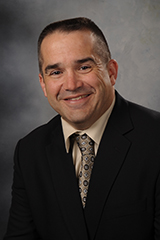November 12, 2019
Something Operational and Something Philosophical

Greetings, everybody. This week I bring you something operational and something philosophical.
From an operational perspective, it is time to give our commitment to a revised memorandum of understanding. Our memorandum of understanding explains how K-State Research and Extension and the local units of its system will work together. We revise our memorandum of understanding as items in the current memorandum of understanding need to be clarified, added to, or changed. The most significant changes, among other more minor revisions, in the revised memorandum of understanding are the following:
• Language that aligns KSRE policy with current state laws and university policy was added in several areas:
o Clarification that KSU’s PPM 3010—the Policy Prohibiting Discrimination, Harassment, Sexual Violence, Domestic and Dating Violence, and Stalking—applies to all Extension operations, including programming, employment and hiring. This policy provides protections for Extension employees as well as program participants.
o The MOU now includes the requirement that Extension boards complete a hiring module before taking part in the screening and interviewing of local unit agent candidates. This policy and new procedure was put in place to ensure that equal employment opportunity laws are being followed at all levels of the hiring process.
o Clarification that the use of the 4-H name and emblem must be done in accordance with state and university guidelines in addition to federal guidelines. This provides additional oversight to protect the integrity of the 4-H Youth Development program.
• Language about how KSRE and the local unit governing board work together to jointly supervise local unit agents was strengthened. It was clarified that employment actions involving local unit agents shall be subject to university employment policies and procedures, and that while the governing board would have input, KSRE would be responsible for carrying out employment actions. This was done to ensure consistency in the application of employment related practices.
• Language was added to specifically allow for the termination of volunteers as a part of the volunteer management process.
We will need to have each Extension board review the memorandum of understanding and have the Extension Board President or their designee from the executive committee sign the memorandum of understanding. The memorandum of understanding needs to be signed and submitted to Dr. Jim Lindquist in Extension Field Operations by February 15.
If you watched Monty Python’s Flying Circus, you know the term “And Now for Something Completely Different.” Well, this may not be completely different, but it is a change in tenor from a memorandum of understanding.
I had the pleasure last week of promoting the advantages of Extension activities at Makerer University in Uganda. Their agricultural economics department and ours are collaborating on a USAID project. In Uganda, Extension is housed in the Ministry of Agriculture, the equivalent of our USDA. Universities do not become involved unless asked to be involved. There were signs during the trip that Makerer University may be able to partner more and better with the Department of Extension in the future.
My week was capped off by giving a seminar where I promoted how universities can help improve lives, economies, and society by being involved in Extension and engagement activities. As I gave my seminar to a packed room of faculty and students, the listeners were respectful but very quiet. The Extension professional side of me, especially the “edutainer” in me, was thinking “This isn’t going over well!” Then the Q & A started, and the questions kept coming and coming. Both students and faculty were excited about the idea of taking the university’s education and research to the people that need it the most.
I was excited about it, too. Too often we forget about what our profession is all about – providing the education, research, and facilitation the people need to enable them to make decisions that will improve their lives, livelihoods, and communities. We do this without any vested interest except the betterment of the people we serve. This connection we have with the people we serve is special. It is something we must never forget. In fact, it must be in the forefront of our minds at all times.
I must admit that sometimes even I have let the other “stuff” of our job overshadow the amazing mission we have and the accomplishments we make as Extension professionals. When you get to that point, it is important to try to re-root yourself in why we do what we do. We are here to enable others to succeed. I rediscovered this once again in of all places, Uganda. Maybe you won’t have to travel so far!